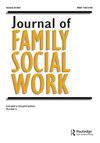Beginning at the beginning in social work education: a case for incorporating arts-based approaches to working with war-affected children and their families
IF 0.7
Q3 SOCIAL WORK
引用次数: 5
Abstract
ABSTRACT Building on the growing body of work that recognizes the value of participatory arts-based methods such as drawing, collage, Photovoice, and drama in work with war-affected children and young people and their families, this article asks the question, “How can the findings from practice based interventions become central to the work of preparing social workers who are at the beginning of their professional programs?” As the article highlights, there has been only limited attention in the literature on what these methods might mean for social work education, particularly in relation to family practice and especially in working with war-affected children. What could arts-based family practice with this population look like? The article maps out a framework that draws together two bodies of literature, the literature on the arts in social work education, and literature on the arts and war-affected children and their families. Central to this framework is a set of five pedagogical practices that align well with arts-based methodologies: reflexivity, situating one’s self, observation, ethical practice, and taking action. The article concludes that though arts-based methods as central to the social work curricula are not a panacea, “learning by doing” is a promising practice for those starting out in the profession.从社会工作教育的起点开始:将基于艺术的方法与受战争影响的儿童及其家庭一起工作的案例
摘要在越来越多的作品认识到参与式艺术方法(如绘画、拼贴、摄影声音和戏剧)在与受战争影响的儿童、年轻人及其家庭合作中的价值的基础上,本文提出了这样一个问题:,“基于实践的干预措施的发现如何成为为处于专业课程初期的社会工作者做准备工作的核心?”正如文章所强调的,文献中对这些方法对社会工作教育可能意味着什么的关注有限,特别是在家庭实践方面,特别是在处理受战争影响的儿童方面。在这样的人群中,以艺术为基础的家庭实践会是什么样子?这篇文章提出了一个框架,将两个文学体结合在一起,一个是社会工作教育中的艺术文学,另一个是受战争影响的儿童及其家庭的艺术文学。该框架的核心是一套五种教学实践,这些实践与基于艺术的方法论非常一致:自反性、定位自我、观察、道德实践和采取行动。文章的结论是,尽管作为社会工作课程核心的以艺术为基础的方法并不是万能的,但“边做边学”对那些刚开始从事这一职业的人来说是一种很有前途的做法。
本文章由计算机程序翻译,如有差异,请以英文原文为准。
求助全文
约1分钟内获得全文
求助全文
来源期刊

Journal of Family Social Work
SOCIAL WORK-
CiteScore
2.10
自引率
0.00%
发文量
4
期刊介绍:
Each issue of the Journal of Family Social Work contains peer reviewed research articles, conceptual and practice articles, creative works, letters to the editor, and book reviews devoted to innovative family theory and practice subjects. In celebrating social workers" tradition of working with couples and families in their life context, the Journal of Family Social Work features articles which advance the capacity of practitioners to integrate research, theory building, and practice wisdom into their services to families. It is a journal of policy, clinical practice, and research directed to the needs of social workers working with couples and families.
 求助内容:
求助内容: 应助结果提醒方式:
应助结果提醒方式:


